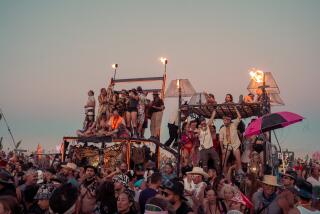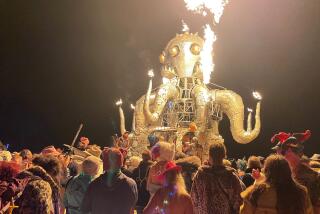New ticket lottery ignites Burning Man debate
Danielle White isn’t sure what she’s going to do with her fire-spitting unicorn now.
For the last 12 years, the Venice resident has teamed up with friends to build elaborate “art cars” and campsites at the annual alt-cultural bacchanal Burning Man, which has grown to draw 50,000 people over Labor Day week to the windswept desert outside of Reno for impromptu music, costumes, installation art and an inclusive attitude. White’s past Burning Man projects included cheeky ideas like “Bacon Without Borders” and “The Whiskey and Whores Saloon.” This year her group, Camp Charlie, spent months rigging a car into a 24-foot-high unicorn totem that shoots fire out its horn.
Then her preparations halted when she and her team discovered that many of them couldn’t get tickets. To accommodate growing demand, and in a nod to the egalitarian spirit that informs the festival, organizers changed the ticket distribution policy this year from first come, first served to a lottery for the $280 to $400 passes. That lottery was promptly swamped with a reported 80,000 entrants — and an uncertain number of potential ticket scalpers.
Now White is at a difficult crossroads, joining a chorus of festival regulars — or “burners” — who lost the lottery. Tickets are popping up on Craigslist and other sites, but for sometimes double the price and often more.
On Wednesday night, to address an outcry from festival veterans, organizers announced they’d be releasing a reserved block of 10,000 tickets to camps and teams of Burning Man regulars, based on criteria including years attending the festival. Those burners would have the opportunity to buy them at the regular price of $390.
The new ticketing policy, however, is threatening to upend this intricate community, which views the event as a rite of transformative spirituality — and a Dionysian escape from buttoned-up American life.
“I’m trying to be positive, but my friends think it’s the end of the world,” White said. “I might be naïve for thinking that way. But if a ticket doesn’t turn up after 12 years of going, that might be a sign it’s time to move on.”
Since its beginnings in San Francisco in 1986, Burning Man is beloved for having no planned attractions or entertainment (save for the ritualistic burning of a towering wooden human effigy), relying entirely on attendees to construct their own artwork, costumes and installations. Many veterans spend months planning, building and shipping structures ranging in size from a single tent to a city block.
But in 2011, for the first time, the event sold out. The new lottery system was introduced as a solution. But this system, in which group blocks of tickets couldn’t be purchased, received immediate and widespread backlash for decimating the delicate social infrastructure of Burning Man teams, which build much of what the event is known for. Members of teams like White’s often won only a fraction of the tickets they’d need to attend as a whole — Burning Man officials estimate only 20% to 25% percent of large-project team members received tickets.
Without such teams, no one knows what another sold-out Burning Man will look like, an uncertainty that unnerves even longtime attendees used to a certain spirit of jovial chaos.
“There’s an old Bertolt Brecht quip about government, where he said if the government and people don’t trust each other, why doesn’t the government dissolve the people?” said Brian Doherty, an editor at the libertarian magazine Reason and author of “This Is Burning Man,” a definitive history of the festival. “This year, Burning Man elected a new people.”
The ticket lottery came after a major reorganizing of Burning Man’s business structure, in which the six original organizers transferred ownership of the event, which spends millions of dollars annually on infrastructure, office space and a staff of 42, to a nonprofit board of 17 members, Black Rock City.
“We don’t see the lottery as a failure,” said Marian Goodell, director of business and communications for Black Rock City and a founding board member of Burning Man. “An open sale wouldn’t have been able to take into account the long-standing family and teamwork either. A lottery seemed more equitable. We are aware of the issues and challenges, and all elements of our solutions will come from the community.”
Ticketing is a necessity; though Burning Man takes place in an open desert, traffic concerns, environmental reviews and infrastructure costs limit capacity. However, veteran burners knew of last year’s sellout and could have prepared to be among the first to buy tickets using the first come, first served method. Some say that the lottery solved a problem that didn’t really exist.
“I don’t know of anyone who last year intended to go and couldn’t because they didn’t get a ticket,” Doherty said. “What the organizers did was a big solution to a small problem.”
Organizers had initially withheld the block of 10,000 tickets to keep some options open in light of the changing policy. Those tickets are supposed to go on sale March 28. Criteria include years attending the festival, adherence to values including a “leave no trace” cleanup policy and the scale of the team’s project. Goodell said the organization has contacted team members and interviewed them to see who fit the criteria.
But meanwhile, many veterans are asking themselves if they need to make other plans. Josh Reiss, a photographer known to the burner community as CuriousJosh who runs a Los Angeles Burning Man online forum, said he’s unsure if he’ll be able to go, given that only four of his usual group of 40 people won lottery slots.
“I’m hearing a lot of frustration because, given the tenet of including people, if none of us can show up, what are we actually including people in?” Reiss said. “But then, I’ve also heard stories of incredible compassion, where old-timers like me just gave away their tickets to open it up and spread the culture of Burning Man.”
That mix of fear and the sense that it all will somehow work out is defining the Burning Man ticket debate. Black Rock City has no plans to dramatically change the actual festival in years to come, and Goodell is staking much goodwill on the Burning Man Project, a charity-centric effort to re-create the emotional experience of Burning Man outside the festival weekend with home-construction projects, arts education and other civic works.
Even as veterans debate ideas of how to move forward, that sense of optimism remains.
“Burning Man organizers helped build this tremendous community. Regardless of whether we get tickets or not, we should be doing something extraordinary of our own,” said Kestrin Pantera, a Los Angeles actress and musician who met her husband at Burning Man and hosts a Burning Man theme camp of more than 100 people annually. The intent, she says, should “not just be ‘What are we building for Burning Man?’ but ‘What are we building this weekend?’ That’s the spirit on which the event was founded.”
More to Read
The biggest entertainment stories
Get our big stories about Hollywood, film, television, music, arts, culture and more right in your inbox as soon as they publish.
You may occasionally receive promotional content from the Los Angeles Times.











